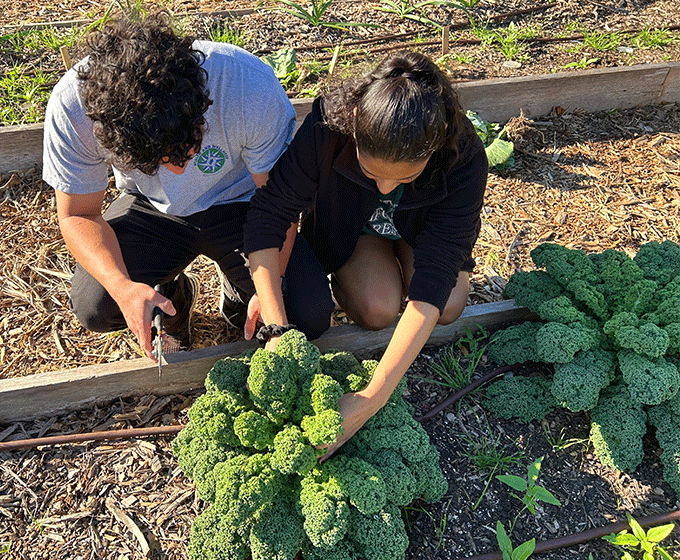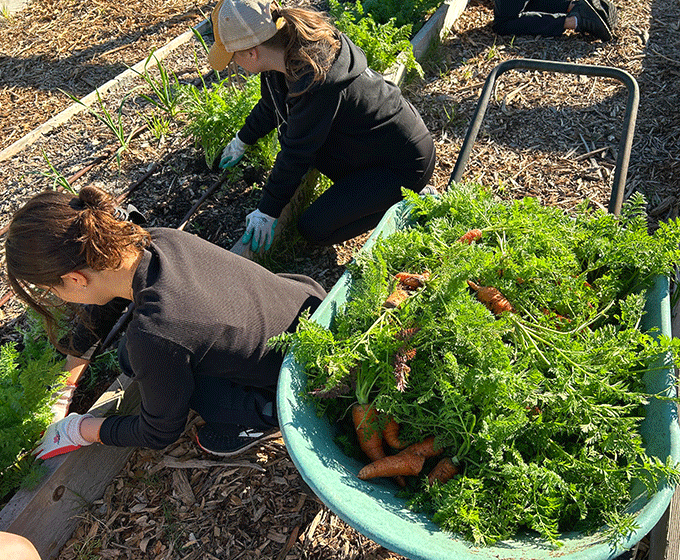
MARCH 1, 2024 — With the freezes behind us, and the promise of springtime, the UTSA students pull out the winter harvest of carrots, broccoli, kale, cabbages and more to make way for peppers and tomatoes. Just being in the garden can be a great study break, a way to connect with others, and get some Vitamin D along the way.
The UTSA Community Garden is in its sixth year of harvest, run solely by volunteers among the students, staff and faculty. In between planting and harvesting days, volunteers take time to water, fertilize and check on the crops’ progress.
This past planting day in the fall semester saw the highest number of volunteers yet, planting herbs, pollinator plants and vegetables — all arranged among six raised beds, including one raised higher to provide wheelchair accessibility. Harvestables included herbs like rosemary, chives, peppermint, cilantro and winter vegetable crops like brussels sprouts, broccoli, cauliflower, onion and kale.
“We put much more in the ground this time and should have a large harvest for spring,” said Lance Whitlock, senior lecturer in Nutrition and Dietetics.
The main driver of the garden is the Green Society, a student-led organization that works in conjunction with the UTSA Sustainability Council and the UTSA Office of Sustainability to ensure that the university is continuously incorporating best practices.

Tyler Pursch, a senior pursuing his Bachelor of Arts degree in geography and environmental stability, is the current garden manager for the Green Society. Pursch decides what to plant and when and helps to run events for the Green Society.
“We have events planned all semester, whether it's weeding or laying mulch or planting or harvesting,” he said.
Faculty and students in the UTSA College for Health, Community and Policy (HCAP) are also active, particularly faculty and students from the Department of Dietetics and Nutrition. Many of the students are members of DANSA (the UTSA Dietetic and Nutrition Student Association), which partners with the Green Society to care for and maintain the garden.

Students in HCAP’s Bachelor of Science in Nutrition and Health degree program have the opportunity to work with the garden as an experiential learning component to their degree. The degree places a high emphasis on sustainability, and giving students the opportunity to work hands-on and grow their own produce will help them take those skills back to their communities to decrease food insecurity.
“Since its start, we had a vison make the garden functional and beautiful,” said Mattalyne Pall, DANSA secretary and coordinated program in dietetics student. “Like with any goal, we started with the small, necessary steps to build our foundation. Pulling weeds, fixing the irrigation system and spreading mulch took place over those initial weeks of the fall semester. With each visit to the garden, more and more people came out to get their hands dirty and help, and before we knew it, planting time had arrived.”
Volunteer opportunities with the garden are open to anyone on campus, and several student groups have faithfully participated in planting and harvesting.
“We want as many people as possible to come out and get their hands dirty,” Pursch said. “A morning in the garden can be healing and spiritual in a way that’s difficult to express. You’ll come in not knowing what to expect, and leave with a new community of friends, rewarding sweat on your brow and maybe a few gardening tips you can take home to use in your own space.”
Historically, produce grown in the garden has gone back into the hands of the volunteers who planted it. However, now that the Roadrunner Pantry has refrigeration units and continues to expand, Whitlock says there is potential to bring some of the produce back to the food pantry to help Roadrunners in need.
The Roadrunner Pantry, housed in the Whataburger Resource Room on both the Main and Downtown campuses, operates on donations from the campus community. Through a self-selection model, students are allowed five multi-meal food items providing supplemental nutrition support for up to a week. This year, the Roadrunner Pantry has distributed more than 104,000 pounds of food to hundreds of students.
“We’re currently collaborating with DANSA for future fundraising, because seedlings, tools and repairs all cost money,” Pursch said. “Funding is critical for the campus garden. We’d also like to incorporate more features that will attract life to the garden, like nectar feeders, bird perches for pest control, and an insect hotel.”
The Green Society, DANSA and many other student and faculty volunteers are working year-round to make the garden not only fruitful and sustainable, but a place for community where the UTSA community can come to the garden to become a part of something bigger than themselves.
“One of my favorite poets is Wendell Berry, a Kentucky farmer and environmental activist, who wrote ‘The significance of the work we do is determined by our understanding of the story in which we are taking part,’” Pursch said. “This comes back to connecting with something greater than yourself. In the campus garden, the story isn’t always going to involve a fairy-tale-esque successful harvest. The story is so much more than what we grow or fail to grow. The story is about the people with their hands in the garden beds, working for the hope, not the promise, of what could come.”
UTSA Today is produced by University Communications and Marketing, the official news source of The University of Texas at San Antonio. Send your feedback to news@utsa.edu. Keep up-to-date on UTSA news by visiting UTSA Today. Connect with UTSA online at Facebook, Twitter, Youtube and Instagram.
Día en la Sombrilla, formerly Fiesta UTSA, is a festival hosted each spring as a part of Fiesta® San Antonio events. Sponsored by Roadrunner Productions, the event features music, food, confetti, games, event t-shirts, and more.
Sombrilla Plaza, Main CampusCovidence is a systematic & scoping review tool used to streamline the process of screening and reviewing articles. Using this software, research teams can easily import studies, perform automatic deduplication, and extract data using templates. This workshop will show attendees how to start a review in Covidence, add collaborators, and get started on screening.
Virtual (Zoom)In this workshop, attendees will be introduced to Pandas, a Python tool for working with data easily. It makes it simple to organize and analyze information when data is organized and categorized, like spreadsheets or tables.
Group Spot B, John Peace LibraryEach fall and spring semester, students convene at the Main Campus at UTSA with booths, ideas and prototypes. A crowd of judges, local organizations, students, faculty and sponsors walk around and talk to the students about their projects and ask questions. Students get the real-life experience of "pitching" their project with hopes of getting funding or support to move to the next level.
UTSA Convocation Center, Main CampusJoin the doctoral candidates for the Doctoral Conferreal Ceremony and celebrate their accomplishments.
Arts Building Recital Hall, Main CampusCelebrate the graduates from the Carlos Alvarez College of Business, College of Education and Human Development, Margie and Bill Klesse College of Engineering and Integrated Design and University College.
AlamodomeCelebrate the graduates from the College for Health, Community and Policy, College of Liberal and Fine Arts and College of Sciences.
AlamodomeThe University of Texas at San Antonio is dedicated to the advancement of knowledge through research and discovery, teaching and learning, community engagement and public service. As an institution of access and excellence, UTSA embraces multicultural traditions and serves as a center for intellectual and creative resources as well as a catalyst for socioeconomic development and the commercialization of intellectual property - for Texas, the nation and the world.
To be a premier public research university, providing access to educational excellence and preparing citizen leaders for the global environment.
We encourage an environment of dialogue and discovery, where integrity, excellence, respect, collaboration and innovation are fostered.